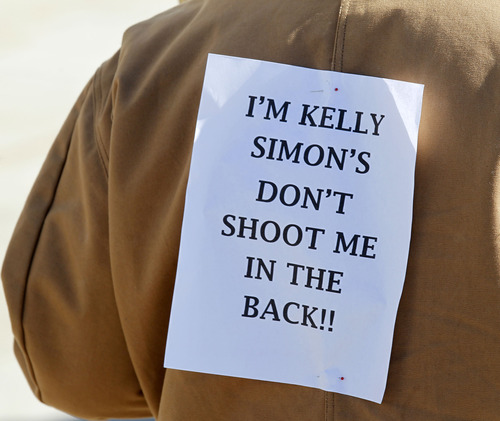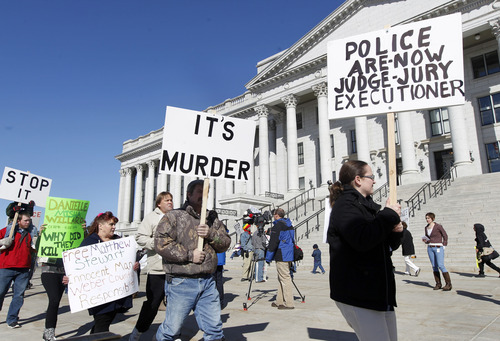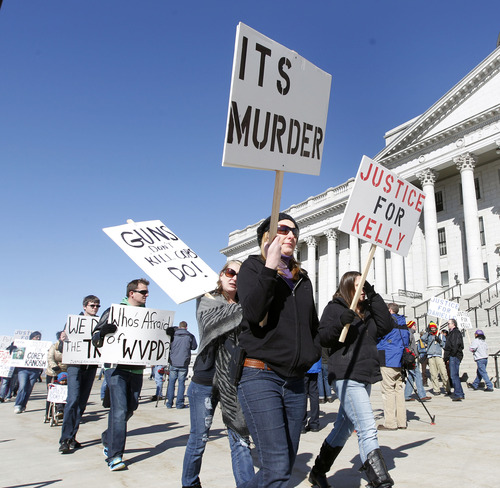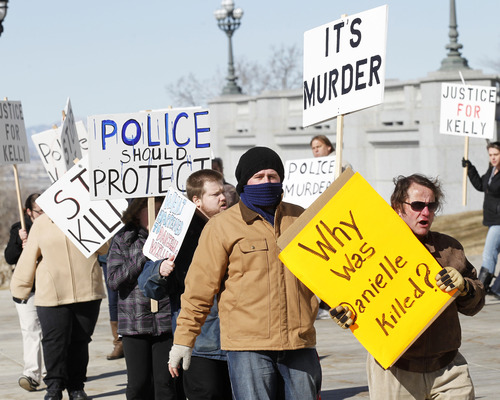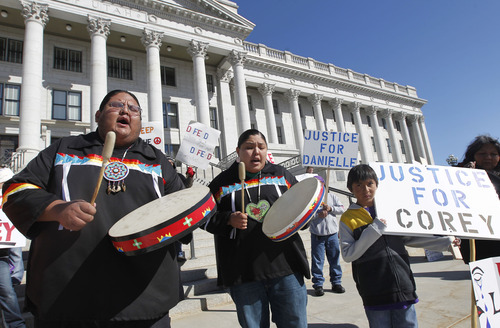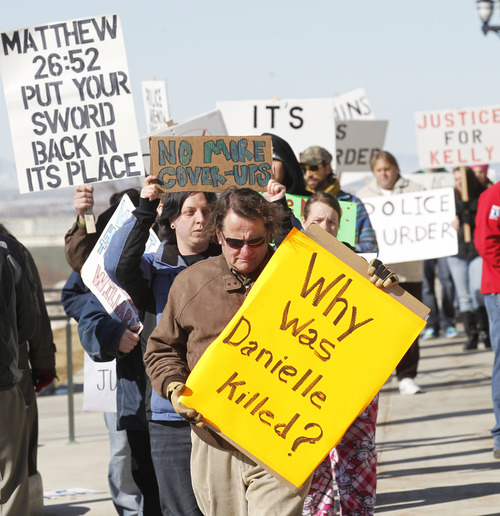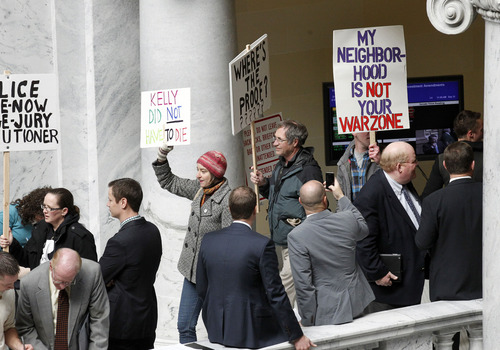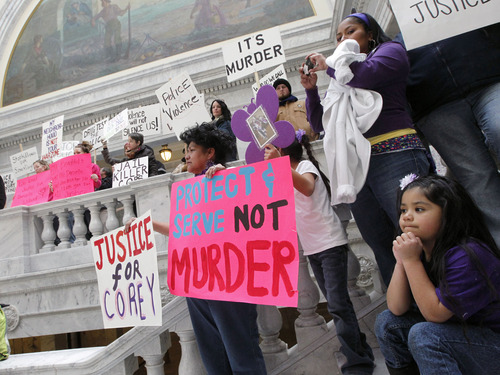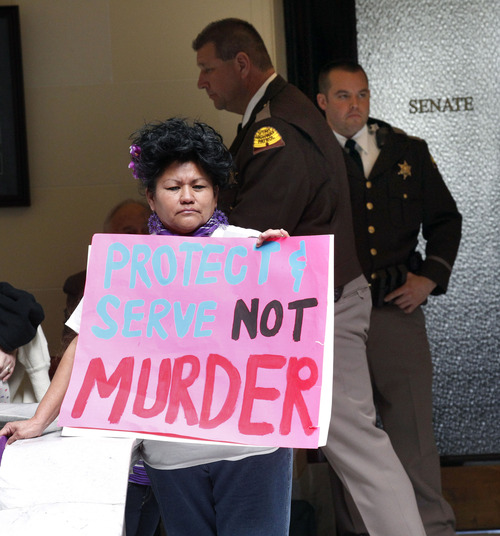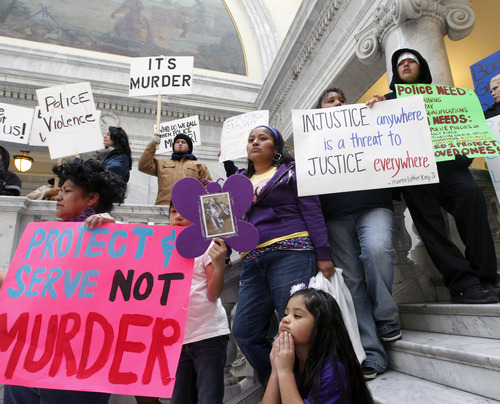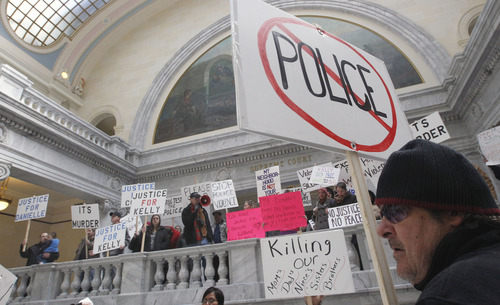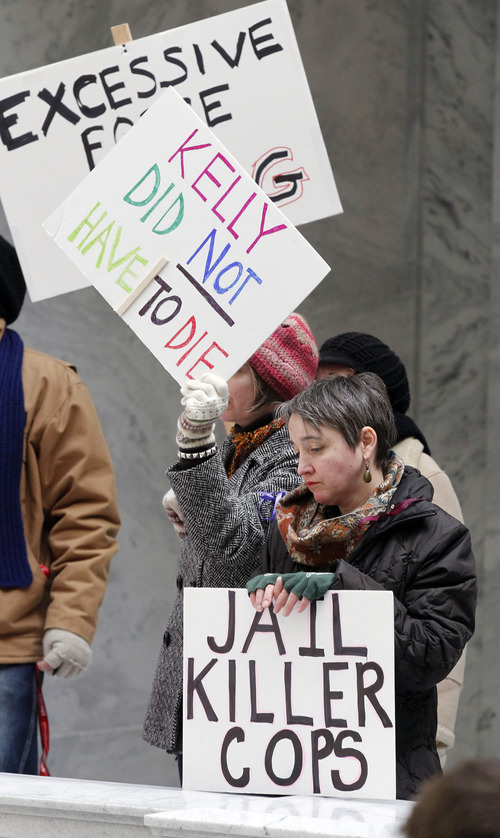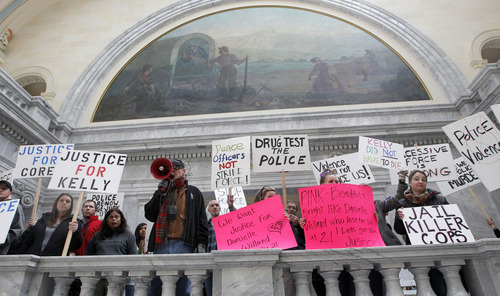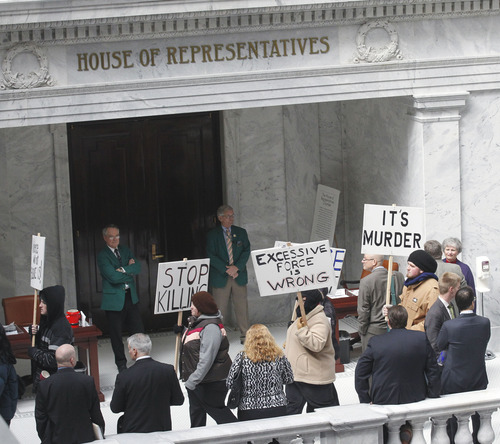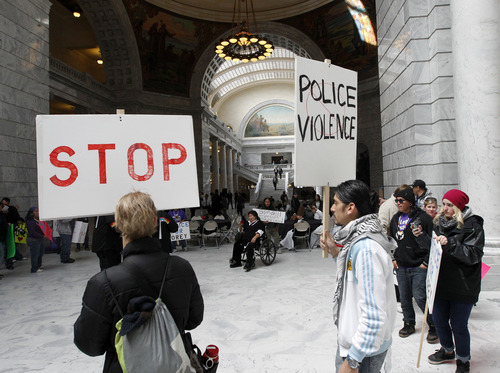This is an archived article that was published on sltrib.com in 2013, and information in the article may be outdated. It is provided only for personal research purposes and may not be reprinted.
Protesters who gathered at the state Capitol Monday morning demanded police reform as well as justice for friends and family killed by police bullets.
As roughly 50 people formed a ring around a podium on the Capitol steps, Melissa Kennedy spoke loudly into a microphone about her daughter, Danielle Willard, who was killed Nov. 2 by two West Valley City drug detectives. Though Kennedy's voice didn't carry far in the cold wind, the crowd cheered as she demanded greater accountability for police.
"The way they handle it has got to change," Kennedy said. "I will not stop this until it does."
Police have said that Willard died after being shot twice in the head by two plainclothes detectives. The detectives reportedly were conducting a drug investigation at an apartment complex.
Though the West Valley City Police Department has released few other details, Kennedy has said police told her Willard was unarmed and in a car at the time of the shooting. She describes her daughter as an "innocent victim" of police violence.
The investigation into Willard's death has already dragged on for four months, making it the second lengthiest officer-involved shooting probe since Salt Lake County District Attorney Sim Gill took office in 2011. Gill — whose office will determine if the shooting was justified — said Monday that he had expected the investigation would wrap up around the end of February and that he will be communicating with West Valley City police later this week.
Gill said he understands the family's sense of urgency; he told The Salt Lake Tribune more than a month ago that he had a "frank" talk with West Valley City police about the probe.
But on Monday, Gill said he could not provide any details about the investigation, and that officials are waiting for results of work performed by agencies outside the police department.
During Monday's protest, Kennedy said she has been stonewalled by authorities who refuse to talk to her. As a result, she knows very little about why her daughter died.
"I want the corruption to stop," she said.
Gill said he was willing to talk Kennedy but is not aware of any efforts to reach him.
He also said his administration has taken steps to curb officer-involved shootings. His office has invested in a high-tech danger assessment simulator that will be active in the spring and provide preventative training for 300 officers a year. He also hopes to form an independent task force to evaluate officer-involved shootings.
But for protesters who clutched signs accusing police of murder, such efforts are overdue. The gathering was organized by Christian Warmsley, a private investigator who said too many young people are being killed by law enforcement. Warmsley — who wore a dark suit to the protest and who uses the "Law and Order" theme song as his ring tone — said officer-involved fatal shootings have been particularly prevalent during the past year.
"I think we've gotten to a point where the police shoot first and ask later," he said during a lull in the protest.
Warmsley, who investigated the October 2012 killing of Corey Kanosh, called on law enforcement officials in Millard County and West Valley City to step down. Like Kennedy, he also expressed hope that officers would face increased accountability in the future. Warmsley was hired to investigate Kanosh's shooting by his family.
Kanosh reportedly was killed after he and another man led sheriff's deputies on a chase in Millard County. When deputies eventually tried to take him into custody, a fight ensued and Kanosh was shot.
Kanosh's family filed a federal wrongful death lawsuit in December, alleging that Millard County officials failed to provide them with reports on the shooting.
Since taking office in 2011, Gill has investigated 26 officer-involved shootings. He said 14 of them occurred in 2011, while nine were in 2012 and three have taken place so far this year. Thirteen of the shootings resulted in fatalities and three of the 26 were deemed unjustified.
"That's probably the most ruled unjustified," Gill said. "My administration has made a commitment to call it like we see it."
But even shootings that were ultimately justified have left friends and family asking questions. Scott Simons spent much of Monday's protest shouting into a bullhorn and leading the group through the capitol rotunda. Simons' daughter, Kelly Simons, was killed Jan. 23 in Salt Lake City by the Joint Criminal Apprehension Team, a shooting that Gill ruled was justified. Still, Simons said he grieves for his daughter and wants policy changes that would result in fewer citizen deaths.
As the protesters clapped and cheered for Simons, bystanders gazed at signs bearing the names of his daughter and those of Willard and Kanosh. The signs accused police of shooting people in the back and of acting as judge, jury and executioner. They demanded a stop to the violence.
Later, after leading the group back out onto the Capitol steps, Simons called the recent rash of officer-involved shootings a pandemic, pointing out that his daughter, Willard and Kanosh were all killed within 90 days of each other. Like many at the protest, Simons expressed hoped the gathering would stress the need for greater accountability for police.
"Is it going to be the police safety first, or the people's safety first?" Simons asked. "We've got to have a change."
Twitter: @jimmycdii —
Officer-involved shootings
Salt Lake County District Attorney Sim Gill said his office has investigated 26 officer-involved shootings since he took office in 2011. Thirteen of those shootings resulted in death.


